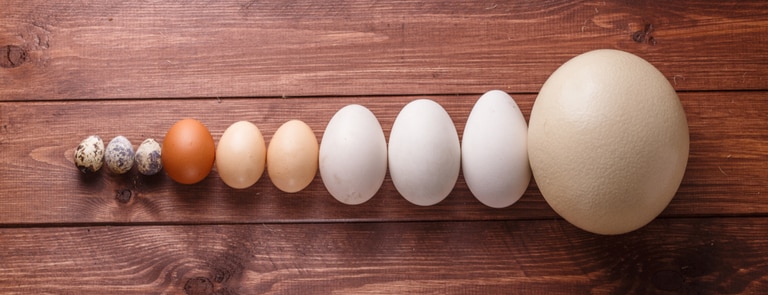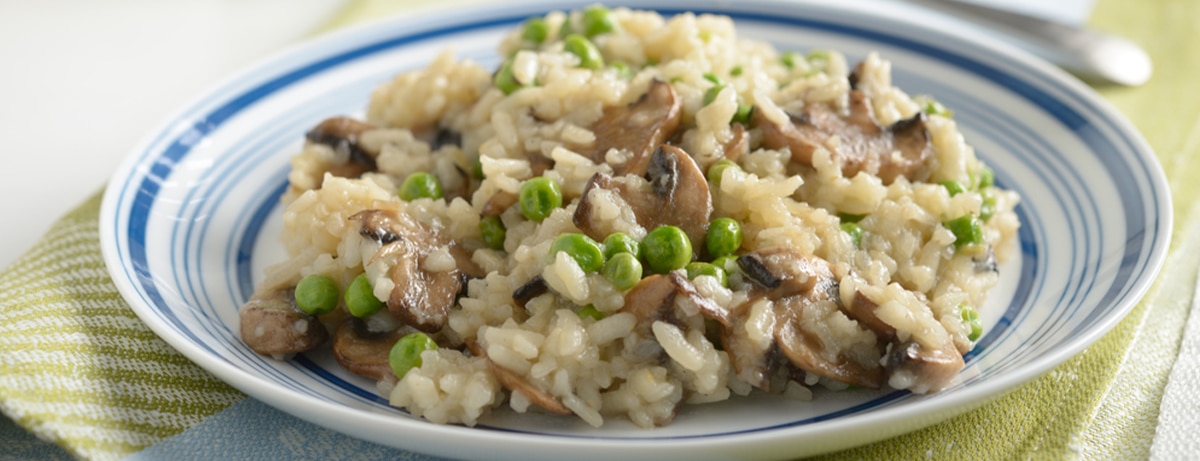10% off £35
Chicken, duck or ostrich – which egg type is best?

You are probably all too familiar with chicken (or hen) eggs but have you ever tried a duck egg?
How about an ostrich egg?
Here we have a look at the differences between the three types of egg. And discover exactly which eggs contain the most nutrients.
What are the differences between chicken, duck and ostrich eggs?
There are some key differences between the three types of egg, and we are not just talking about the birds that have laid them!
The size
There are usually two sizes of chicken eggs (also known as hen eggs) available: medium and large. And there is not a great deal of difference between these two sizes.
An average chicken egg weighs around 50g whereas a duck egg is slightly larger at 70g.1
Of course, the biggest of these three types of egg by far is the ostrich egg.
These monsters of the egg world are around 6 inches in diameter and can weigh up to 1.3kg.2
Each ostrich egg is the equivalent of 24 chicken eggs, so you will not be able to eat a whole ostrich egg by yourself!3
Because ostrich eggs are so huge, they are not really a practical food source (try fitting one in your regular egg pan to boil).
However, chicken and duck eggs can be used almost interchangeably within breakfast dishes and baking.
You will just need to adjust the quantities to account for the duck egg’s larger size and larger yolk.
The shell
A chicken egg’s shell is very thin and easy to crack on the side of a bowl or pan – the only issue is making sure no shell falls in!
Duck eggs have a slightly thicker shell, which you need to hit a little bit harder to crack.
However, it is not too difficult to get to the good stuff inside. The thicker shell also gives them a longer shelf life than chicken eggs.4
Ostrich eggshells are thicker than both chicken eggs and duck eggs and are therefore significantly harder to crack.
You may need to use a butter knife to crack them. Some people like to drill a hole in the ostrich eggshell, drain the egg and then use the shell for decoration.5
The yolk
The yolk of a duck egg is very large in comparison to the white, which gives the egg its creamy texture.6
An ostrich egg’s yolk makes up only about 20% of the egg.
Compared to chicken eggs, ostrich eggs have a higher proportion of albumen (egg white) and a lower proportion of yolk.7
The flavour
The flavour of all three eggs is quite similar. Duck eggs are slightly richer than chicken eggs and have a creamier consistency.8
Ostrich eggs have a richer, more buttery taste, which is described as more intense than the taste of a chicken egg.
Some people even describe the taste as “gamey”.9
The nutrients
All three eggs contain lots of nutrients and they are all great sources of protein. There are subtle differences between the nutrient content of each type of egg.
Due to their larger yolks, duck eggs have a higher fat content than chicken eggs and contain more calories.
They contain around 9.6g of fat, compared to 5g of fat in chicken eggs.10
An ostrich egg contains around 100g of fat and approximately 2000 calories.11
Again, you would not ever eat an entire ostrich egg, so if we were to divide it by 24 (the equivalent in chicken eggs), then the fat content is very similar, if not slightly lower.
Ostrich eggs are also very similar in nutritional content to chicken eggs.12
Duck eggs contain slightly more nutrients than chicken eggs, when comparing like for like sizes.
They have almost a day’s worth of vitamin B12 which is needed for red blood cell formation, DNA synthesis and healthy nerve function.13
They also contain almost twice as much vitamin D as a chicken’s egg and duck egg protein levels are slightly higher – they have around one gram more than a chicken’s egg.14
A duck egg’s cholesterol level is also a lot higher than a chicken’s egg so you may wish to take this into consideration when deciding which egg is best.15
Availability of eggs
Chicken’s eggs are very widely available, they can be bought at almost every supermarket and convenience store.
There is also the option of getting them directly from a farm, or from anyone who has a few chickens in their back garden.
Nowadays, most large supermarkets also stock duck eggs, either on their shelves or in their online stores. They are usually slightly more expensive than chicken eggs.
Ostrich eggs for eating are much less widely available. They are sometimes available at high end supermarkets or are available to buy from farm shops, where they keep ostriches on the farm.
Because they are much rarer than either chicken or duck eggs, they are significantly more expensive.
So which egg is best?
All three eggs are very rich in nutrients.
Chicken and duck eggs can be eaten almost interchangeably, there are just slight differences in their nutrient profile.
It is probably best to choose from one of these eggs, rather than opting for an ostrich egg, unless you want to be eating scrambled eggs all week!
Last updated: 31 March 2021
- https://www.healthline.com/nutrition/duck-eggs
- https://www.livescience.com/27433-ostriches.html
- https://www.epicurious.com/archive/seasonalcooking/farmtotable/visual-guide-eggs
- https://www.motherearthnews.com/real-food/the-proscons-of-eating-duck-eggs-vs-chicken-eggs-zbcz1705
- https://www.epicurious.com/archive/seasonalcooking/farmtotable/visual-guide-eggs
- https://www.epicurious.com/archive/seasonalcooking/farmtotable/visual-guide-eggs
- https://www.sciencedirect.com/topics/agricultural-and-biological-sciences/ostriches
- https://www.motherearthnews.com/real-food/the-proscons-of-eating-duck-eggs-vs-chicken-eggs-zbcz1705
- https://chewtheworld.com/ostrich-egg-taste/
- https://www.motherearthnews.com/real-food/the-proscons-of-eating-duck-eggs-vs-chicken-eggs-zbcz1705
- https://www.livestrong.com/article/345784-nutritional-facts-on-ostrich-eggs/
- http://safariostrich.co.za/2016/04/nutritional-facts-ostrich-eggs-vs-chicken-eggs/
- https://www.healthline.com/nutrition/duck-eggs#nutrition
- https://www.healthline.com/nutrition/duck-eggs#nutrition
- https://www.healthline.com/nutrition/duck-eggs#nutrition














